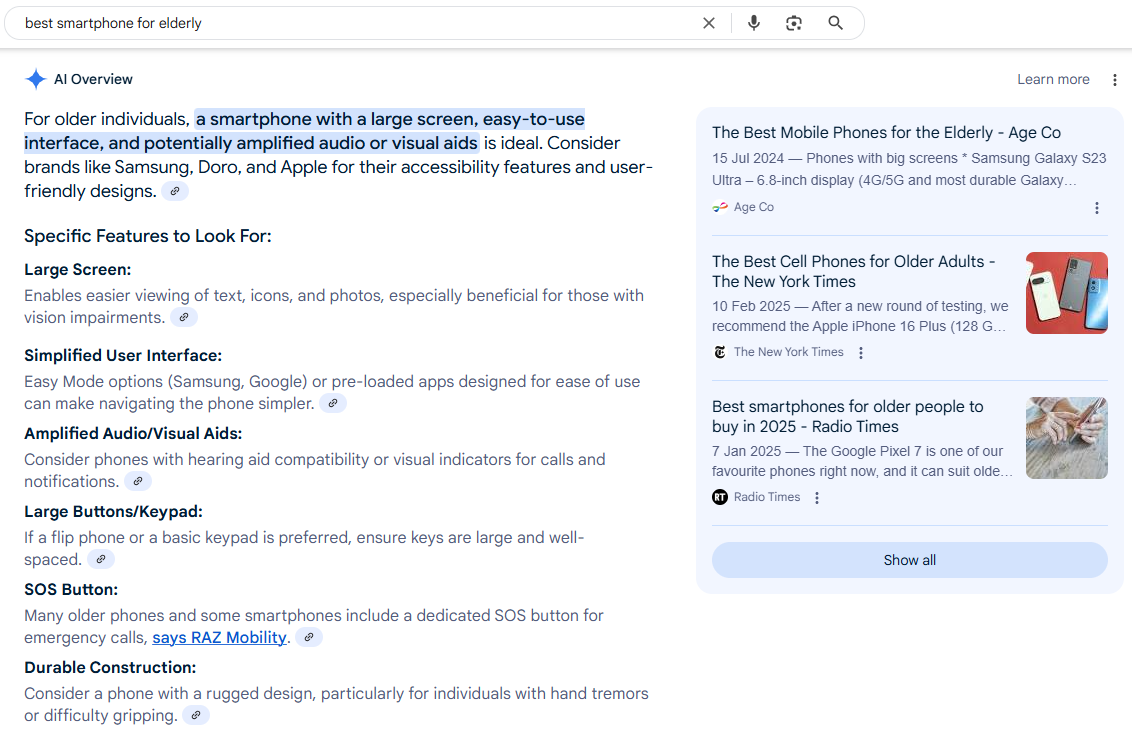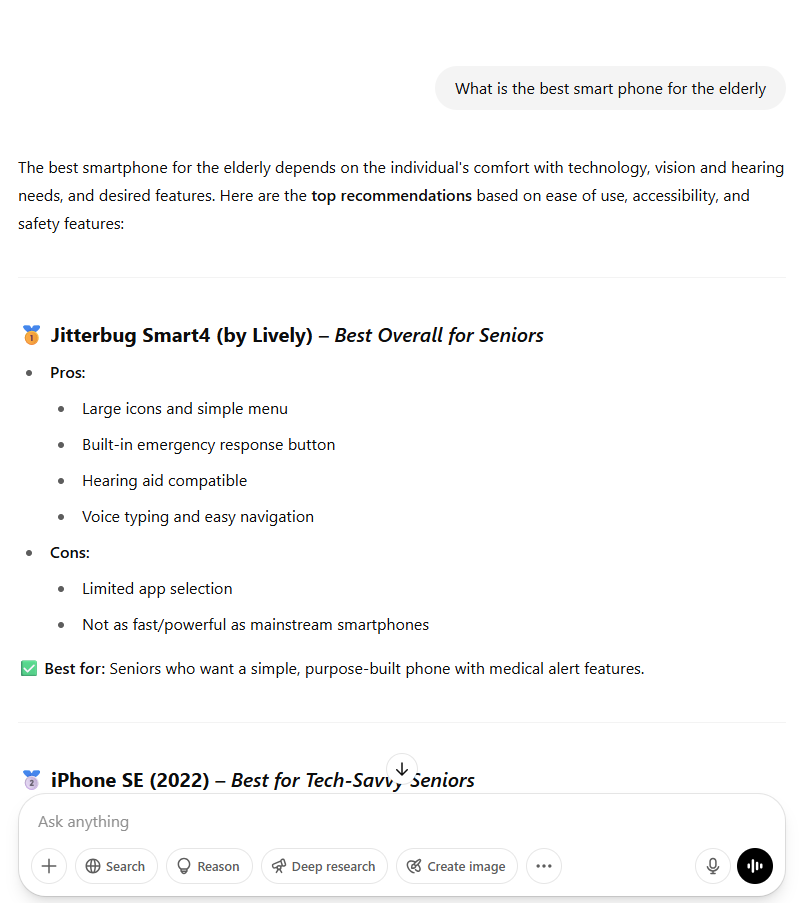AI is helping us move faster by automating repetitive SEO tasks, surfacing insights, and making optimisation more efficient. But while we’re using it behind the scenes, the real transformation is happening in how people search, and what shows up in the search results when they do.
Whether you’re in a competitive space or aiming to build long-term visibility, the impact of AI on search is already reshaping how brands win (and lose) in organic search.
So, how is AI changing search?
People aren’t just going to Google anymore, and even when they do, they’re often not clicking through to websites.
Tools like ChatGPT (a large language model, or LLM) are being used as a new kind of search engine. In fact, over 7 million people in the UK have already used generative AI at work, according to Deloitte’s 2024 Digital Consumer Trends report.
When ChatGPT hit 100 million users in just 8 months, it marked a clear shift in search habits. Google, in contrast, has only seen 2% growth year-on-year since 2022. That tells us people want faster, more conversational answers, not just ten blue links.
At the same time, Google is integrating its own AI capabilities into search in the form of AI Overviews, and they’re already having a noticeable impact on visibility and click-through rates.
What are AI Overviews, and why do they matter?
AI Overviews are summaries at the top of some Google search results. They’re powered by Gemini (Google’s own LLM) and are designed to answer questions quickly, without needing to scroll or click.
These overviews mostly appear for informational searches, and they’re becoming more common. According to Advanced Web Ranking, AI Overviews appeared in 13.14% of search queries in March 2025, and that number is rising.
Each overview often includes links to sources, but the information is pulled into the search page itself. This means people are finding what they need without clicking through.

Are AI Overviews reducing clicks?
Yes, significantly. This is one of the most immediate effects on organic performance.
As Danny Goodwin reported on Search Engine Land:
And here’s some recent data that shows the impact clearly:
- Ahrefs data shows a 34.5% lower average clickthrough rate (CTR) for the top-ranking page, compared to similar informational keywords without an AI Overview
- Amsive data shows a CTR decline of -15.49% on average when AI Overviews are on the page
- Similarweb data shows 20% fewer clicks on search results with AI Overviews
This all feeds into a broader trend of the rise in zero-click searches, when users find their answer directly in the search results without clicking any further. That’s not new (as we’ve seen this before with answer boxes or featured snippets), but AI Overviews are accelerating it.

Should you still try to appear in AI Overviews or LLM results?
Yes, but the goal is different now.
You may not get the same click-through rate, but appearing in an AI result still builds trust, authority, and brand recognition. People may not visit your site immediately, but they’ll remember you as a credible source.
It’s better to be visible than invisible, especially in a world where search results are shrinking.
How do you get featured in AI Overviews?
There’s no guaranteed formula, but we’re starting to see patterns.
Here’s what makes a difference:
- Answer the question clearly and early in the content
- Use structured formats like bullet points, subheadings, and summaries
- Match the intent behind the search: what’s the person trying to figure out?
- Focus on informational keywords, which are more likely to trigger Overviews
- Rank well organically - Google often pulls AI Overview links from page one results
- Implement schema markup and maintain strong technical SEO foundations
And while Google is the focus here, it’s also worth noting that every LLM presents information differently. What works for Gemini may not be the same for ChatGPT or Claude. That’s why we’re constantly reviewing how each one references and displays content.
So, how is AI changing search?
Tools like ChatGPT are now being used as search engines in their own right. And while they don’t always show citations, some do - especially when pulling answers from trusted, structured, and high-authority content.

Right now, your content may already be referenced by these models, but without visibility into how often or where. New analytics tools are starting to track this, including GA4 in some cases. It’s early days, but it’s clear this is an area worth watching.
And most importantly, even if clicks don’t come, impressions still matter. Being part of the answer, whether in a summary or a citation, still keeps your brand visible.
Does AI mean the end of organic search?
No, but it does mean organic search is evolving.
Google still handles 8.5 billion searches a day. ChatGPT is growing fast, but currently processes around 14 million daily. So, for most brands, Google is still where people are searching.
That said, the impact of AI on search isn’t theoretical anymore. It’s already shifting behaviour, especially for informational queries. And the more AI becomes part of the search process, the more we need to adapt.
What should brands do next?
If your organic strategy is already built on strong fundamentals, clear structure, content that helps people, and technically sound pages, the good news is you’re not starting from scratch.
But there is still work to do:
- Monitor which queries trigger AI Overviews
- Identify where clicks are dropping, and where impressions are still strong
- Structure content for both users and AI
- Stay agile, this is evolving fast, and so should your approach
We’re already helping clients in sectors like retail, healthcare, B2B, and travel to understand where their opportunities lie and how to protect and grow their visibility in the face of these changes.

What about voice search?
There’s a generational shift underway. Younger users, in particular, are turning to voice assistants as their go-to way to search, using them to ask a quick question while cooking or get directions on the move. Voice is fast, convenient, and increasingly embedded in daily habits.
But what’s even more interesting is where this could go next. As AI models become more sophisticated, they may begin interpreting not just what is being asked, but how. Tone, urgency, and even emotional cues could help AI understand whether someone is browsing, deciding, or ready to buy.
It’s early days, but it opens up a new dimension in search behaviour, and it’s one we’ll dig into more in a follow-up post. For now, it’s another sign that the search experience is expanding and evolving far beyond the traditional text box.
Want to understand what this means for your site?
Whether you’ve seen a dip in performance, want to spot early warning signs, or just need clarity on how AI Overviews and LLMs are shaping your visibility, we can help.
Let’s take a look at your data, understand where AI is showing up, and build a plan to adapt. Because in this new era of search, the more you know, the better you’ll perform.




